When it comes to fitness and sports performance, most athletes focus on protein shakes, pre-workouts, and creatine. But there’s another important supplement that often gets overlooked: glutamine. This amino acid plays a major role in muscle recovery, immune support, and overall performance.
For athletes, recovery is just as important as training. Without proper recovery, muscles don’t repair, fatigue sets in faster, and performance declines over time. That’s where glutamine steps in. From boosting muscle repair after intense workouts to helping the body fight off stress and illness, this amino acid supports overall athletic health.
In this blog, we’ll break down everything athletes need to know about glutamine. You’ll learn its key benefits, how much to take daily, the best time to use it, possible side effects, and which supplements work best. By the end, you’ll understand how glutamine can become a valuable addition to your training and nutrition plan.
You can also Listen to our Podcast here,
What is Glutamine?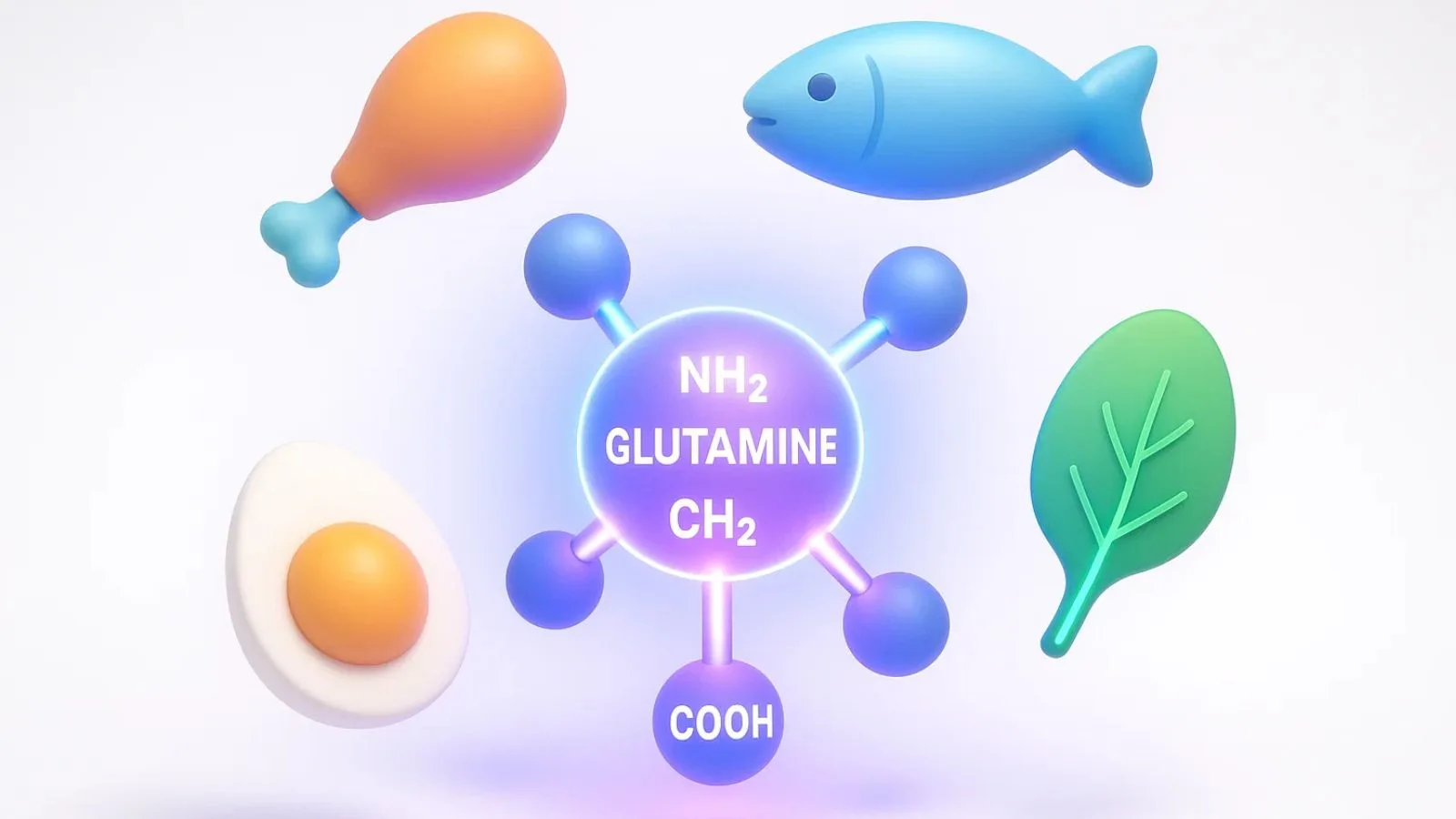
Glutamine is one of the most abundant amino acids found in the body. It’s often referred to as a “conditionally essential” amino acid, which means that under normal circumstances, your body can produce enough on its own. However, during times of stress, illness, or intense training, your body’s natural production may not keep up with the demand. That’s why athletes and fitness enthusiasts often turn to glutamine supplements.
This amino acid serves as a key building block for proteins, which are essential for muscle repair and growth. Beyond that, glutamine plays a critical role in supporting your immune system and maintaining gut health, two areas that often get strained when you’re pushing your body hard in training or competition.![]()
You can naturally get glutamine from protein-rich foods such as chicken, fish, beef, eggs, dairy products, and even plant-based sources like beans and spinach. Still, for athletes with higher recovery needs, supplementation can provide an extra edge.
Glutamine Benefits for Athletes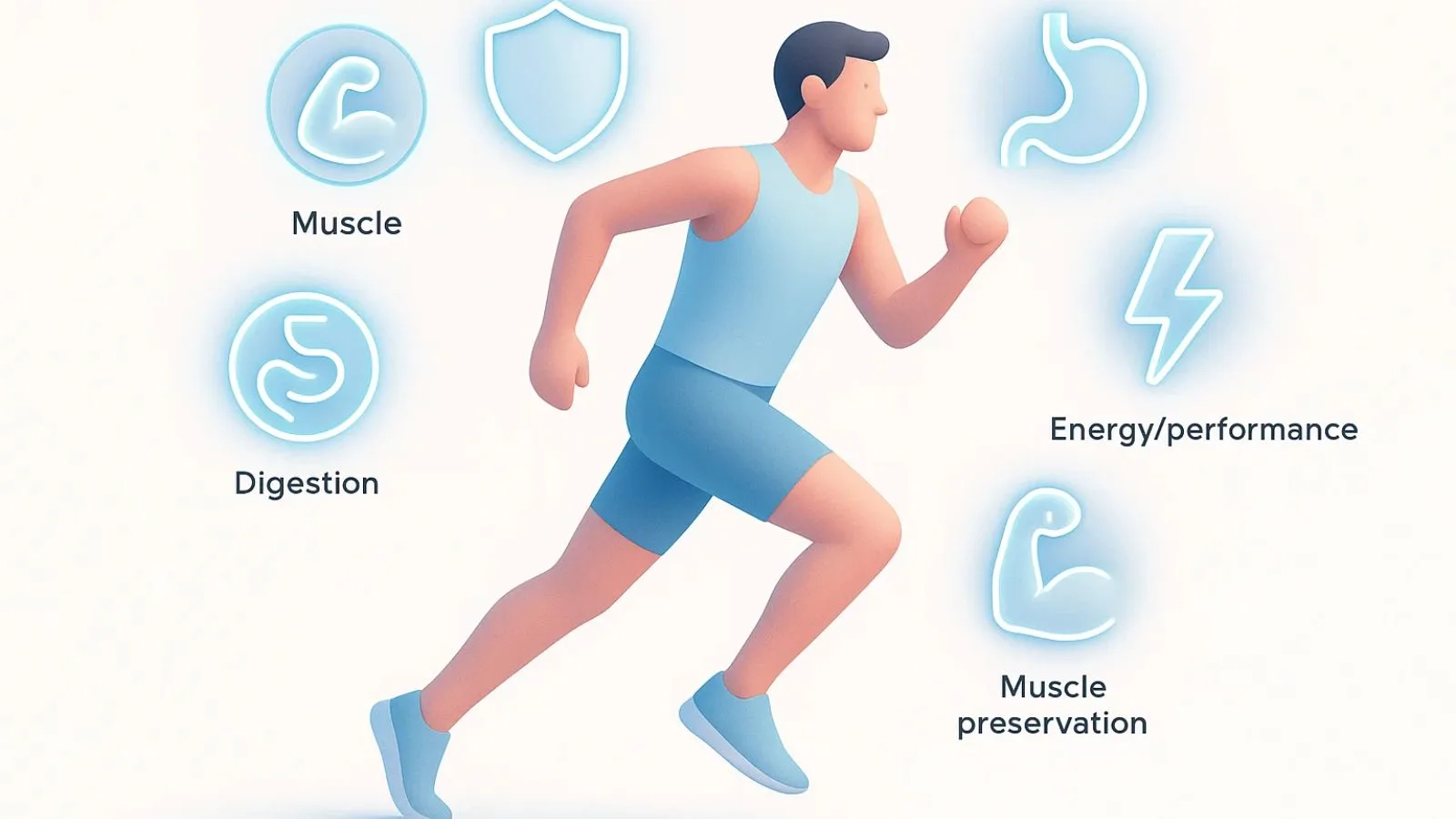
For athletes, recovery and performance are closely linked, and glutamine helps on both fronts. Here are some of the top benefits:
- Faster Muscle Recovery
Intense workouts can deplete glutamine levels, which slows down recovery. Supplementing helps restore those levels, reducing soreness and speeding up muscle repair so you’re ready for your next training session. - Stronger Immune System
Hard training often suppresses the immune system, leaving athletes more vulnerable to illness. Glutamine fuels immune cells, helping the body defend itself and maintain consistent performance. - Improved Gut Health
Many athletes overlook digestion, but a healthy gut is essential for nutrient absorption. Glutamine helps maintain the lining of the intestines, supporting better digestion and overall health. - Enhanced Performance
By reducing fatigue and supporting recovery, glutamine helps athletes train harder and longer without burning out. - Reduced Muscle Breakdown
During intense or long workouts, the body may break down muscle for fuel. Glutamine supplementation helps minimize this process, preserving lean muscle mass.
Together, these benefits make glutamine a valuable tool for athletes who want to recover faster, perform better, and stay healthy throughout demanding training cycles.
How Much Glutamine Should I Take Daily?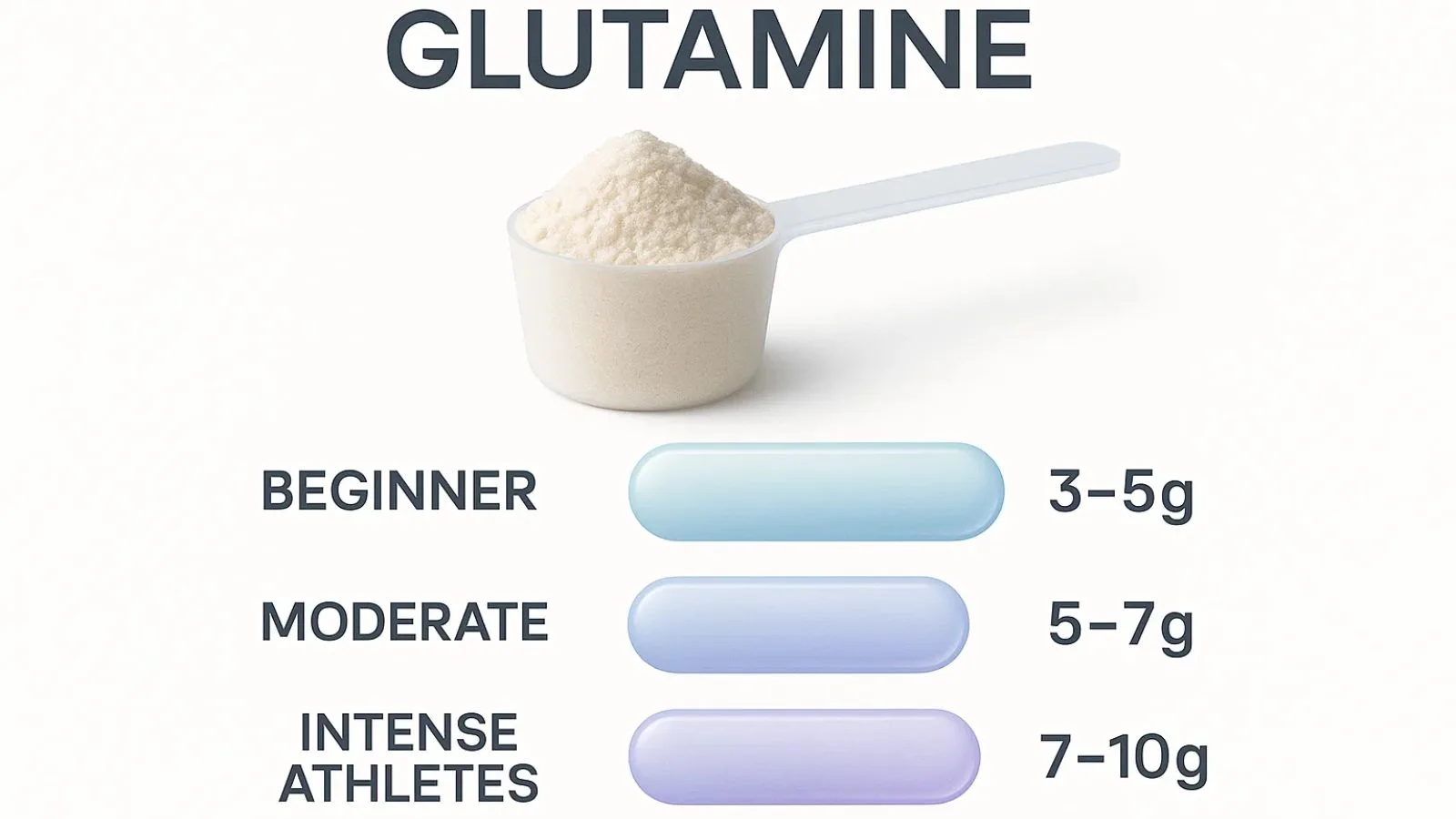
One of the most common questions athletes have is: How much glutamine should I take daily? The answer depends on your training intensity, goals, and overall nutrition.
For most athletes, a safe and effective daily range is 5 to 10 grams of glutamine. Some people split this dosage into smaller servings throughout the day, such as 5 grams in the morning and 5 grams post-workout.
- Casual gym-goers or beginners: Around 3–5 grams daily is usually enough.
- Athletes in intense training: 5–10 grams daily is recommended to support recovery and immune function.
- During illness or heavy stress: Sometimes slightly higher doses are used under professional guidance, but it’s best not to overdo it.
Here’s a quick reference chart:
| Fitness Level | Daily Glutamine Intake |
| Beginner / Light Training | 3–5 g |
| Moderate Training | 5–7 g |
| Intense Training / Athletes | 7–10 g |
Keep in mind that glutamine from food sources also contributes to your total intake. Going above the recommended dosage doesn’t mean faster results, and too much can lead to side effects like digestive discomfort.
When to Take Glutamine: Before or After Workout?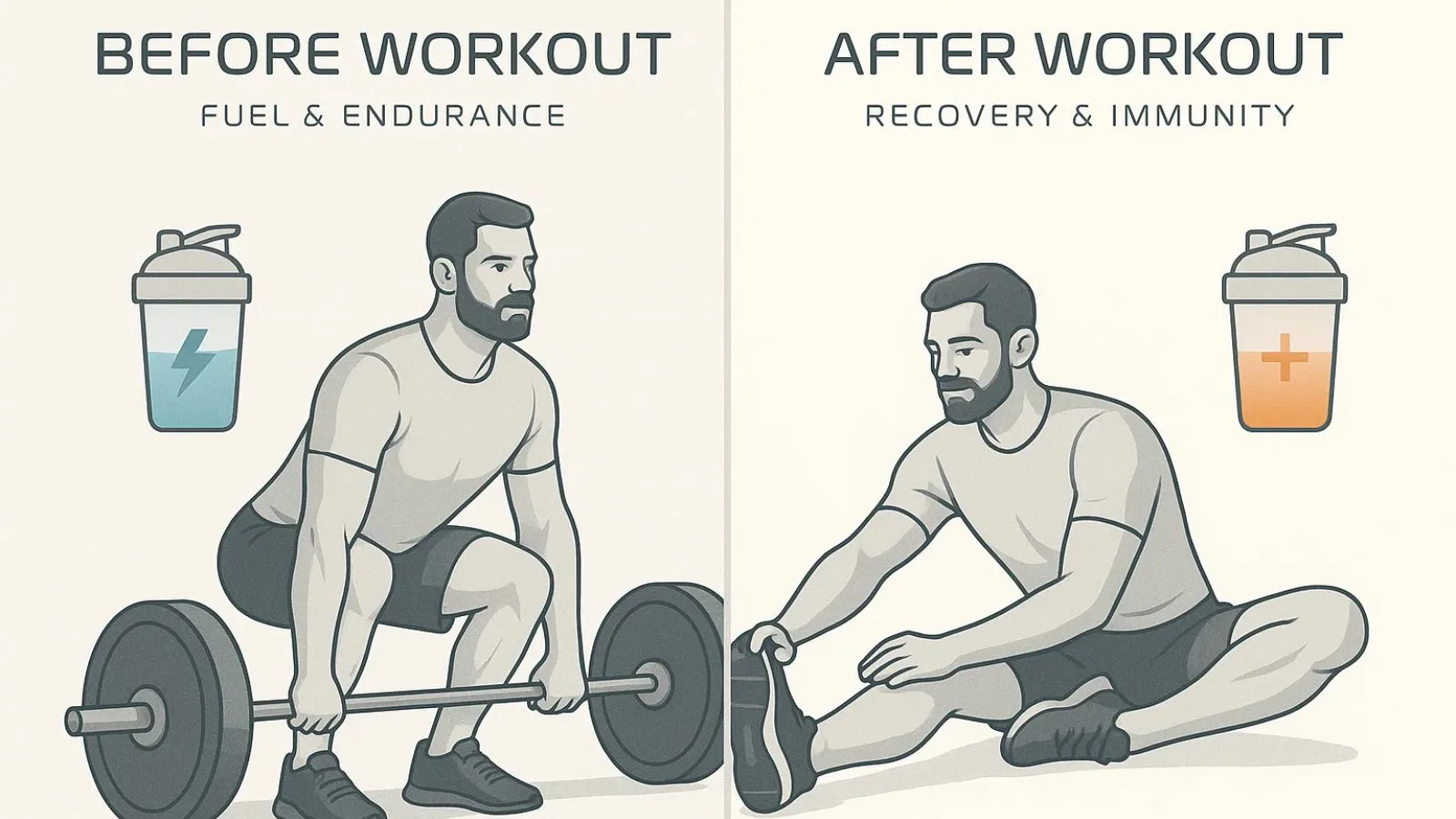
A common question athletes ask is: when to take glutamine before or after workout for the best results? The truth is, timing can make a difference depending on your goals.
Taking Glutamine Before a Workout
- Helps fuel your muscles and may reduce muscle breakdown during long or intense sessions.
- It can improve endurance by delaying fatigue.
- Works well if combined with a pre-workout shake.
Taking Glutamine After a Workout
- Supports faster muscle recovery and reduces soreness.
- Helps replenish depleted glutamine levels in the body.
- Boosts immune function, which is especially important after intense training.
Best Approach:
Many athletes find the greatest benefit by splitting their dosage into a small serving before training and another immediately after. The key is consistency. As long as you take it daily, glutamine will support recovery, immunity, and performance.
Glutamine Uses Beyond Fitness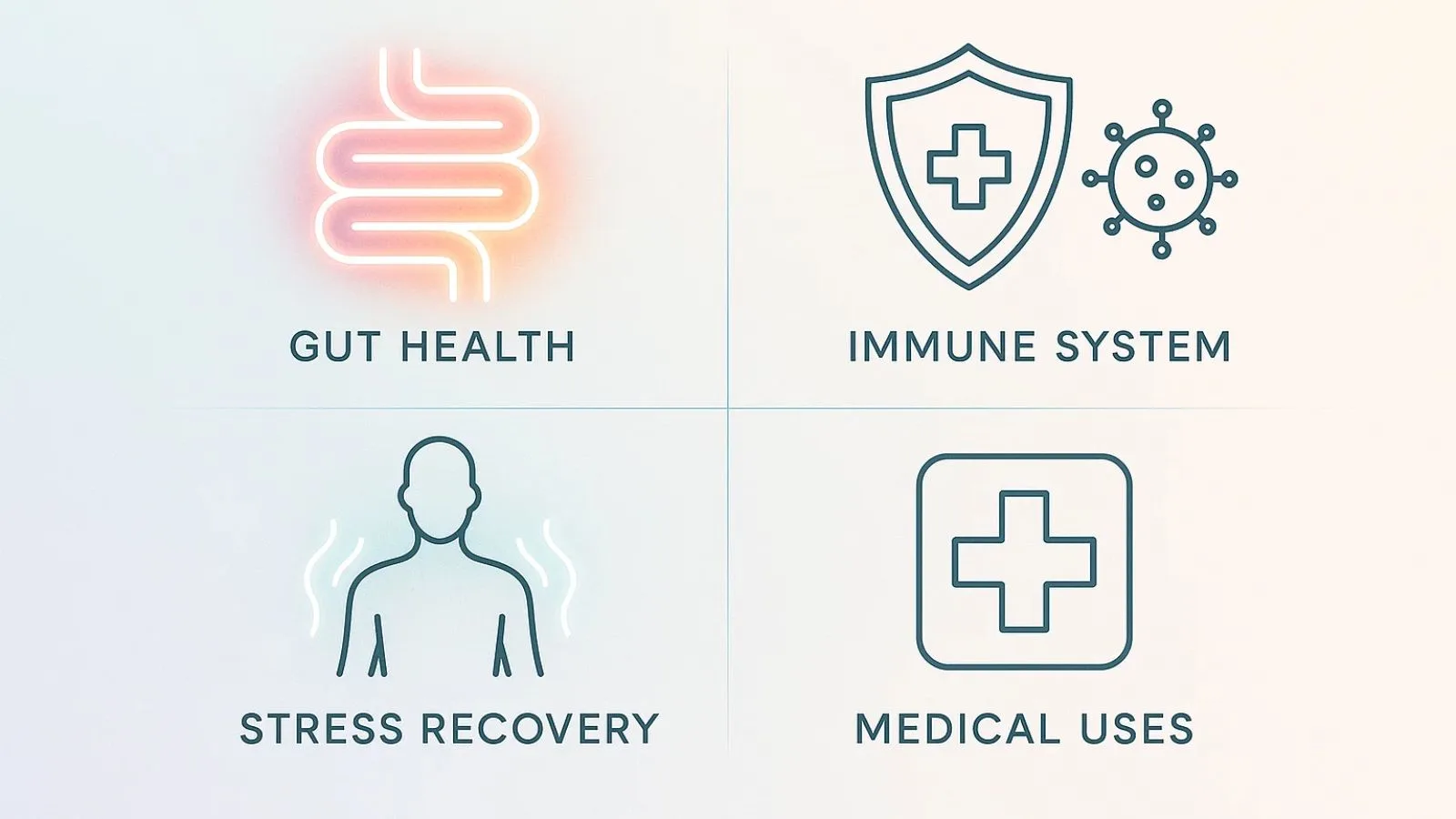
While athletes and fitness enthusiasts often focus on glutamine for muscle recovery, its benefits go far beyond the gym. This amino acid plays a role in several important health functions:
- Gut Health Support
Glutamine is a primary fuel source for the cells lining your intestines. It helps strengthen the gut lining, reduce inflammation, and improve nutrient absorption. This is why it’s often recommended for people with digestive issues or those recovering from illness. - Immune System Function
Even outside athletic performance, glutamine supports white blood cells, helping your body fight off infections and maintain overall health. People recovering from surgery, burns, or illness sometimes use glutamine supplements under medical guidance. - Stress and Recovery
During times of physical or emotional stress, glutamine levels can drop quickly. Supplementing helps the body restore balance, reduce fatigue, and speed up recovery. - Medical Uses
Doctors sometimes recommend glutamine in hospital settings to support patients after surgery, chemotherapy, or trauma, since it helps the body heal faster.
So while glutamine is a powerful tool for athletes, it’s also a versatile amino acid that supports wellness, immunity, and recovery for almost everyone.
Side Effects of Too Much Glutamine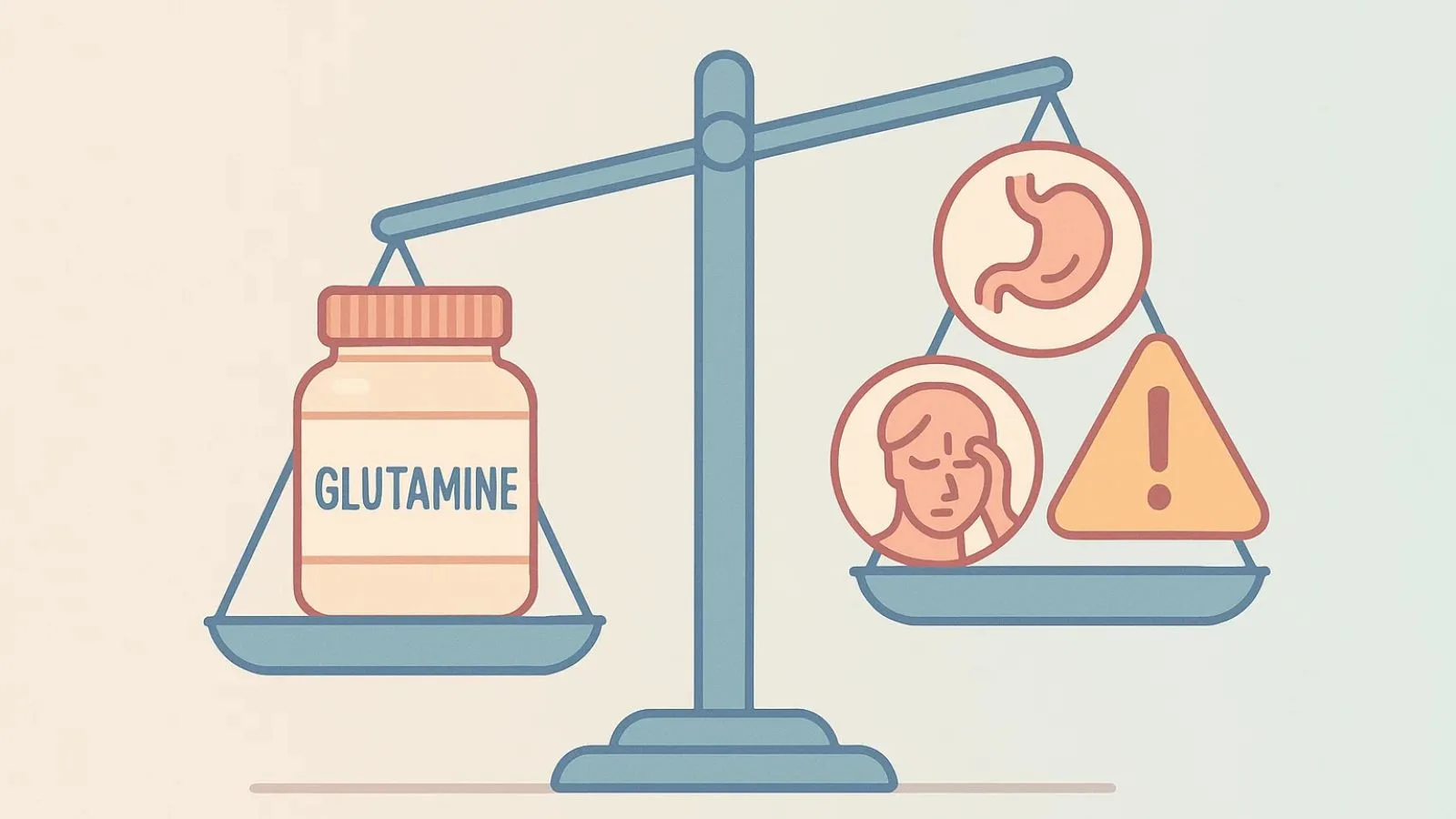
While glutamine is generally considered safe for most people, taking too much glutamine can cause unwanted effects. Like any supplement, balance is key.
Possible Side Effects Include:
- Digestive Issues: Bloating, gas, or stomach cramps may occur if you exceed the recommended dosage.
- Nausea or Headaches: High amounts can sometimes trigger mild discomfort.
- Imbalance with Other Amino Acids: Excess glutamine might interfere with how your body uses other amino acids, affecting muscle function.
Who Should Be Cautious:
- People with liver disease, kidney problems, or seizure disorders should consult a healthcare professional before supplementing.
- Those already getting plenty of protein through food might not need high doses of glutamine.
Safe Upper Limit:
Most experts recommend staying within 5–10 grams per day for athletes. Going beyond 20 grams daily without medical supervision increases the risk of side effects.
The bottom line: glutamine is safe and effective when taken responsibly, but more is not always better
How To Choose The Best Glutamine Supplement For Fitness Goals?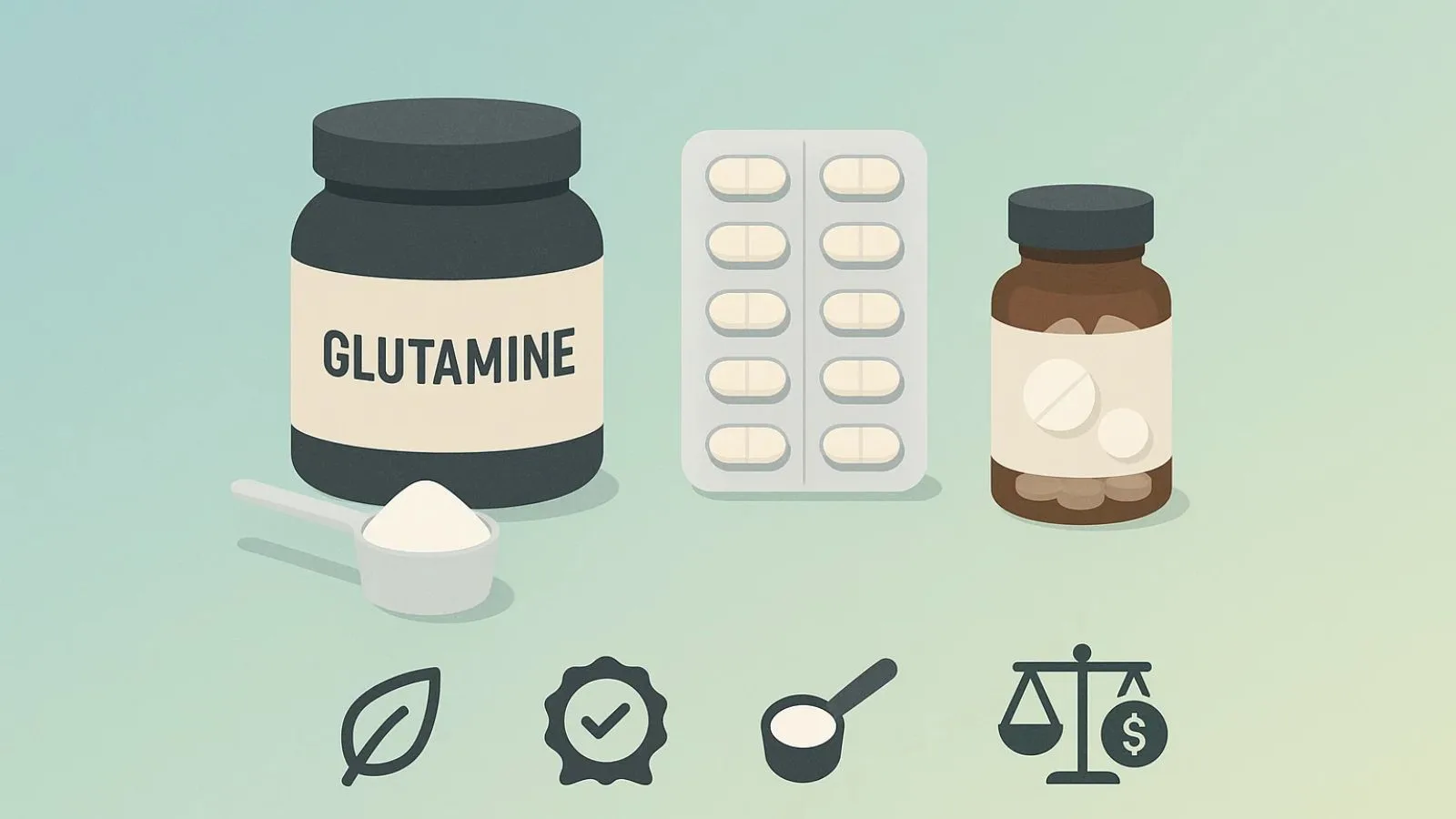
With numerous options available, it can be challenging to determine the best glutamine supplement for your fitness goals. Here are some simple tips to guide you:
- Purity Matters
Look for supplements that contain 100% pure L-Glutamine, free from unnecessary fillers, sugars, and artificial additives. This ensures you’re getting the maximum benefit without extra calories. - Check the Form
Glutamine comes in powder, capsule, and tablet forms.
- Powder: Easy to mix into shakes or water, often preferred by athletes.
- Capsules/Tablets: Convenient for travel or on-the-go use.
- Certifications & Testing
Choose brands that are third-party tested and certified for quality. This ensures the product is free from harmful contaminants and meets label claims. - Dosage Flexibility
Powdered supplements allow you to adjust your dosage easily. This is useful if you want to split your intake between pre- and post-workout servings. - Budget vs. Quality
While cheap supplements might seem attractive, investing in a reputable brand ensures effectiveness and safety.
By considering these factors, athletes can find the best glutamine supplements to match their training intensity, recovery goals, and lifestyle.
Best Glutamine Supplements for Muscle Recovery
Here are some top-rated glutamine supplements that athletes commonly use for muscle recovery, along with why they’re good. Also, advice on picking the right one for your needs.
Top Picks
- Thorne L-Glutamine
- Highly rated for purity and quality; capsules and powder forms available. Healthline
- NSF certified (beneficial for serious athletes). Healthline
- Good choice if you want a trusted, clean product.
- Nutricost L-Glutamine Powder
- Praised for affordability and taste options. Healthline
- A great pick if you’re supplementing regularly and want cost efficiency.
- Double Wood L-Glutamine Supplement
- Offers good value per gram. Healthline
- Comes in powder/capsule forms.
- Women’s Best L-Glutamine Powder (100% Kyowa®)
- Plant-based, tested purity via Kyowa Quality®. Women’s Best
- Clean ingredient profile, suitable for those preferring vegan/plant-based options.
- Supplements from Labdoor Ranking
- Labdoor analysed many brands for content accuracy and heavy metal contamination. Getting one of those ranked highly gives extra assurance. Labdoor
What Makes These Good for Muscle Recovery
- High Purity: Minimal fillers, accurate labeling, free-form L-glutamine.
- Third-Party Testing / Certifications: NSF, cGMP, Labdoor, etc., help ensure what’s on the label is real.
- Flexible Form: Powder lets you measure doses exactly; capsules are handy for travel.
- Good Value: You’re going to use glutamine often, so cost per serving matters.
How to Pick the Right Supplement for Your Recovery Goals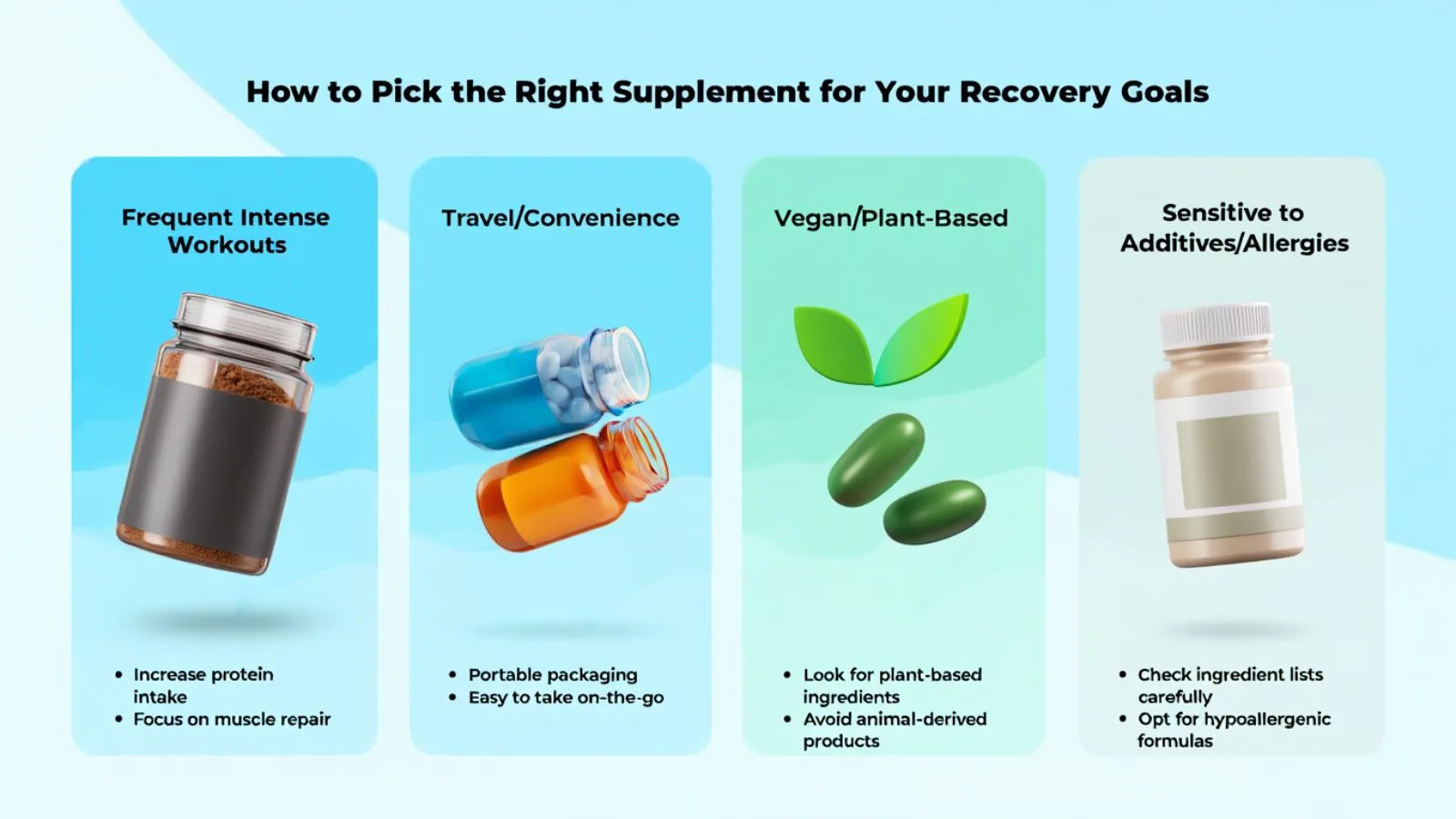
| Goal / Situation | What to Look For |
| Frequent intense workouts | High-dose powder form, trusted purity, affordable per gram. |
| Travel/convenience | Capsules/tablets that are portable. |
| Vegan / plant-based preferences | Products with plant-based certifications (e.g., Kyowa Quality®). |
| Sensitive to additives/allergies | Minimal ingredients; avoid flavorings, artificial sweeteners if possible. |
Track Your Nutrition and Supplements With Calorie Tracker Buddy 
Taking glutamine can be a game-changer for athletes, but it works best when combined with proper nutrition and consistent tracking. That’s where Calorie Tracker Buddy comes in.
This tool helps athletes and fitness enthusiasts stay on top of their daily intake, ensuring that supplements like glutamine are used effectively alongside meals and workouts.
Here’s how Calorie Tracker Buddy can help you:
- Track Supplement Intake: Log your daily glutamine usage so you never miss a dose.
- Monitor Protein & Nutrition: Keep an eye on macronutrients and balance your diet for optimal muscle recovery.
- Personalized Insights: Get tailored recommendations based on your fitness goals.
- Stay Consistent: Easy-to-use dashboards and reminders help you build long-term healthy habits.
By combining glutamine supplementation with a smart tracking tool like Calorie Tracker Buddy, athletes can maximize performance, recover faster, and avoid the guesswork.
Also Read,
Conclusion
Glutamine is more than just another supplement on the shelf; it’s a powerful amino acid that supports recovery, immunity, and overall performance. For athletes, it can mean faster healing after workouts, stronger resistance to fatigue, and better protection against illness during heavy training periods.
By understanding the right dosage, knowing when to take glutamine before or after a workout, and choosing high-quality supplements, athletes can make the most of its benefits without risking side effects from overuse.
The key is balance: use glutamine consistently, track your nutrition with tools like Calorie Tracker Buddy, and combine it with a solid training plan. When done right, glutamine becomes a valuable part of an athlete’s recovery strategy, helping you train harder, recover faster, and perform at your best.
FAQs
- Can I get enough glutamine from food alone?
Yes, glutamine is found in protein-rich foods like chicken, fish, eggs, dairy, and beans. However, athletes under intense training may need supplements to meet higher demands. - Is glutamine safe for long-term use?
For most healthy adults, glutamine is safe when taken within the recommended dosage of 5–10 grams daily. Exceeding this amount regularly may increase the risk of digestive discomfort. - Should beginners take glutamine supplements?
Beginners who follow a balanced diet usually get enough glutamine from food. However, if workouts are intense and recovery feels slow, supplementation can help speed up repair and reduce soreness. - What’s the difference between glutamine and BCAAs?
Glutamine primarily supports recovery, immunity, and gut health, while BCAAs (branched-chain amino acids) focus more on fueling muscles and reducing fatigue during workouts. Many athletes use both together for better results.